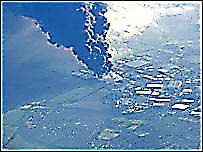
| Write On |
 |
followthemedia.com - a knowledge base for media professionals |
|
|
AGENDA
|
||
The Oil Depot Explosions Near London – one of the Worst European fires since the end of World War II -- Showed That Citizen Journalists Are Getting Even More Enthusiastic About Contributing and They Don’t Seem to Mind Not Getting PaidWithin minutes of the huge oil depot explosions and fires outside London this week citizen journalists were busy sending the BBC and other news organizations their digital pictures and video. The BBC received some 6,500 emails with digital attachments and there were more than 250,000 requests specifically for those amateur offerings alone on the BBC web site. Widely used amateur photo from passing airplaneOther news organizations, including CNN International, were actively asking viewers to send in to them what they could. It was another case of while the professionally taken pictures may technically be preferred, the public’s taste for those first shots, no matter how amateur they may be, takes priority. And the public seems to love seeing their own material on-air or in the newspaper. In all, on the first day of the fires more than half a million unique users accessed clips and professional footage on the BBC site with the uptake about evenly divided between the BBC’s own professional footage and the amateur footage. Among the most widely used photos were those by an airline passenger flying to Ireland whose plane passed over the fire in the early hours. Once he landed in Ireland he emailed images to the Daily Telegraph (they printed one) and to The Times, and the BBC posted several on its web site.
But there were also stories in the press about amateurs shooting video footage and getting very close to the fire. Only when they saw an unexploded fuel tank near the fire did they realize how dangerous the situation and they quickly ran away. That again brought up the debate about how dangerous a news event like this can be and what are the ethics in publicly asking the public to make their contributions. If the public happens to be passing by an event then ok, but it seems some are now going that extra step and seeking out news events they have seen as breaking news on television in the hope they can shoot some amateur footage that might get aired, and how long will it take before one of them gets hurt? It’s the fear of encouraging the amateur to go beyond shooting footage of an event they just happened to be passing that many news organizations now give as a reason why they refuse to pay for such amateur footage. They say they don’t want to encourage people to get themselves into harm’s way and if people thought some money might be involved then they might take risks that they shouldn’t. That’s sounds all well and good but we all know the last thing news organizations want to do, after years of editorial cutbacks, is to pay for something that people seem genuinely happy enough to just give away. But news organizations need to be a little careful in using citizen journalism without first getting a signed contract that gives them the rights and specifies no payments. At the recent NewsXchange meeting media lawyer Rhory Robertson made the point that if no contract has been signed between amateur journalist and news organization then the news organization may not have the license to publish those pictures even if they have actually made a payment for the pictures. In contributing to the BBC, users are told that they do so under the following terms and conditions: “In contributing to BBC News you agree to grant us a royalty-free, non-exclusive license to publish and otherwise use the material in any way that we want, and in any media worldwide. This may include the transmission of the material by our overseas partners; these are all reputable foreign news broadcasters who are prohibited from altering the material in any way or making it available to other UK broadcasters or to the print media. It's important to note, however, that you still own the copyright to everything you contribute to BBC News and that if your image and/or video is accepted, we will endeavor to publish your name alongside it on the BBC News website. Please note that due to operational reasons this accreditation will probably not be possible with video. The BBC cannot guarantee that all pictures and/or video will be used and we reserve the right to edit your comments. “At no time should you endanger yourself or others, take any unnecessary risks or infringe any laws.” In discussing the dilemma of the citizen journalist, and the fear by the professionals that news organizations seem quite happy to have the amateur pictures that might one day mean the professional picture will be unnecessary (read that as possible loss of photo and video jobs) Vicky Taylor, the BBC’s website Interactive section editor, summed up the situation in a story appearing on her own web site: Amateur pictures “give an insight into a story which we would otherwise be unable to get. Journalists still cover the story in the usual way, but the content from readers is an added extra. “The public wants to take pictures. It has become common practice, and we can’t unlock that.” |
| copyright ©2005 ftm publishing, unless otherwise noted | Contact Us • Sponsor ftm |